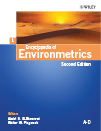Economics, Environmental†
Based in part on the article “Economics, environmental” by J. Hammitt, which appeared in the Encyclopedia of Environmetrics.
Abstract
Environmental economics is concerned with the management of environmental resources and the application of welfare economics (cost-benefit analysis) to the environment. Historically, key areas of focus have been on open-access resources and pollution. Unrestricted access to a fishery can lead to overfishing and depletion or even extinction of the fish stocks, while open access also leads to loss of net economic benefits to society. Burning fossil fuels results in more air pollution than would be the case if polluters had to pay a pollution tax or purchase emission permits. Conventionally, a distinction is drawn between environmental economics and resource economics. Environmental economics studies pollution and the application of cost-benefit analysis, including environmental valuation. Resource economics studies the quantity and optimal use of renewable and exhaustible resources. The fields share many theoretical models and the boundary between them is permeable. This article focuses on environmental economics. Within environmental economics, two principal topics are studied: identifying the optimal environmental quality and developing institutional mechanisms to prevent excessive degradation.



